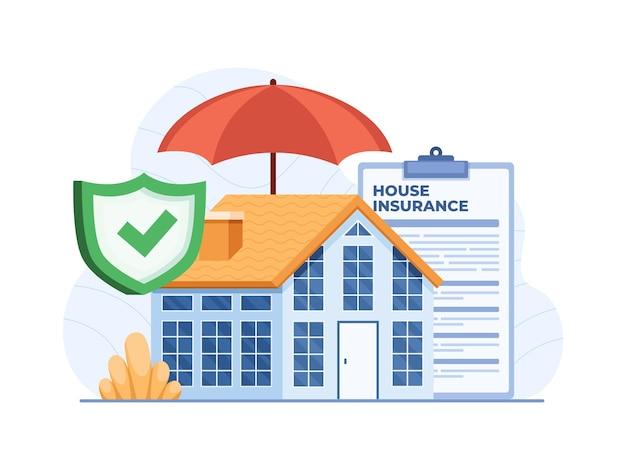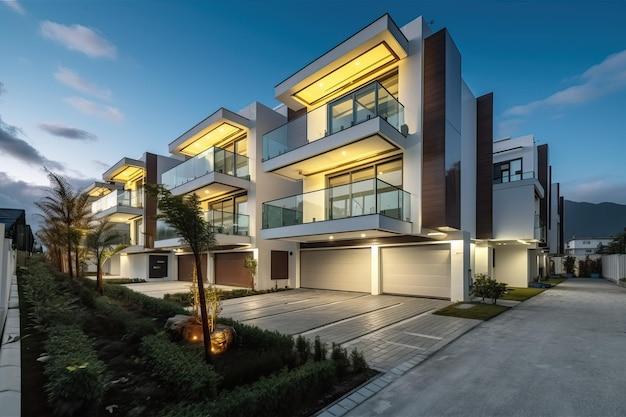Are you a landlord of a multi-unit property and worried about the potential risks and liabilities that could jeopardize your investment? As a property owner, it is crucial to protect your assets and income through insurance coverage that suits your needs.
But with so many multifamily insurance companies and coverage options available, it can be overwhelming to determine which plan is right for you. How much is a multi-unit property, and how does it affect insurance rates for multifamily properties?
In this blog post, we will answer these questions and more, providing you with a comprehensive understanding of insurance for multi-unit properties. We will also discuss owner-occupied multi-family insurance and insurance for 5 unit apartment buildings. Plus, we’ll explore how much insurance costs on a 4-plex apartment and whether you can have multiple property insurance policies.
Moreover, not all insurance policies cover everything. We’ll explain which two things are not covered by homeowners’ insurance and dive into the three primary types of property insurance coverage.
Investing in a multi-unit property is a significant financial undertaking, and it is essential to protect your investment fully. So, if you’re a landlord with a multi-unit property, keep reading to learn everything you need to know about insurance coverage for multi-unit properties.
Multifamily Insurance Companies
When it comes to insurance for your multifamily property, you want to make sure that you’re getting the best coverage possible. That’s why it’s essential to choose the right insurance company. Here are some key things to consider when selecting a multifamily insurance company:
Reputation
You want to work with an insurance company that has a good reputation. Look for companies that have positive customer reviews and a strong financial rating. Check with industry organizations and publications to see if the company has received any awards or recognition.
Experience
An insurance company that specializes in multifamily insurance is ideal. They will have a better understanding of the unique risks associated with owning and managing a multi-unit property. Look for companies that have been in business for a long time, as they will have the experience to handle any situation.
Coverage Options
Different insurance companies offer different types of coverage. You want to make sure that the coverage options provided by the insurance company match your needs. Some key coverage options to consider include:
- Property insurance
- Liability insurance
- Business interruption insurance
- Workers’ compensation insurance
Customer Service
Customer service is another important consideration when selecting a multifamily insurance company. You want a company that is responsive and easy to work with. Look for companies that have a dedicated claims department and offer 24/7 support.
Price
Price is always a consideration when selecting an insurance company. However, you shouldn’t solely focus on the price. Make sure that you’re getting adequate coverage for the price you’re paying.
Key Takeaways
- Choose an insurance company with a good reputation and positive customer reviews.
- Look for a company that specializes in multifamily insurance and has been in business for a long time.
- Make sure the coverage options provided by the insurance company match your needs.
- Consider the level of customer service and support offered by the insurance company.
- While price is important, don’t solely focus on it. Make sure you’re getting adequate coverage for the price you’re paying.
How Much Does It Cost to Own a Multi-Unit Property
If you’re considering purchasing a multi-unit property, whether it’s a duplex, triplex, or a fourplex, you’re probably wondering how much it’ll set you back. Understanding the costs involved will help you determine if a multi-unit property is a sound investment for your financial goals.
The Initial Purchase Price
The purchase price of a multi-unit property varies depending on several factors such as location, size, and condition. A property in a desirable neighborhood will cost more than one in a less attractive area. A property that requires extensive renovations will be cheaper than a move-in ready one.
Financing Costs
Financing a multi-unit property is typically more expensive than borrowing money for a single-family home. Here are some financing costs you can expect:
-
Down Payment – You’ll need to put down at least 20% of the purchase price as a down payment. If you want to avoid Private Mortgage Insurance (PMI), you’ll need to put down more than 20%.
-
Closing Costs – Closings costs can run between 2% to 5% of the purchase price. These costs include origination fees, appraisal fees, and attorney fees, among others.
-
Maintenance and Repairs – Unlike a single-family home, multi-unit properties require regular maintenance and repairs. You’ll need to budget for ongoing expenses to cover the cost of repairs and maintenance.
Insurance Costs
Insuring a multi-unit property is more expensive than a single-family home because there are more people living on the premises, which increases the risk of accidents. Here are some insurance costs you can expect:
-
Property Insurance – You’ll need property insurance to cover damages to the building, such as fire, theft, and vandalism.
-
Liability Insurance – Liability insurance covers you in case someone gets hurt on your property.
-
Rent Loss Insurance – If one of your tenants can’t pay rent, this type of insurance will cover your loss of income.
Property Taxes
Property taxes vary depending on the location of the property. A property in an area with high property taxes will cost more than one in an area with lower taxes. Make sure you factor in property taxes when budgeting for a multi-unit property.
Key Takeaways
- The purchase price of a multi-unit property varies depending on location, size, and condition.
- Financing a multi-unit property is more expensive than financing a single-family home.
- You’ll need to budget for ongoing expenses to cover maintenance and repairs.
- Insuring a multi-unit property is more expensive than a single-family home.
- Property taxes vary depending on the location of the property.
Owner-Occupied Multi-Family Insurance: What You Need to Know
If you’re a landlord or property owner with a multi-unit property that you live in, or plan to live in, you’ll need owner-occupied multi-family insurance. This type of insurance is specifically tailored to the unique needs of property owners who occupy one of their units. Here are some of the main things you should know:
What is Owner-Occupied Multi-Family Insurance
Owner-occupied multi-family insurance covers your property, personal belongings, and liability in case of damages or accidents that happen in your property. This type of insurance is designed to provide coverage for multiple units, and for the owner-occupied unit specifically. The insurance policy is customizable, so you can choose coverage amounts that fit your budget and needs.
What Does Owner-Occupied Multi-Family Insurance Cover
Owner-occupied multi-family insurance covers a range of events, but the following are some of the most common:
- Property damage caused by fire, wind, hail, or other natural disasters
- Water damage caused by burst pipes or other plumbing issues
- Theft, vandalism, or malicious damage to your property
- Accidents resulting in injuries that happen on your property
- Legal claims that arise from accidents or injuries that happen on your property
- Loss of rental income due to a covered loss
Why Do You Need Owner-Occupied Multi-Family Insurance
As a landlord or property owner, you have unique needs when it comes to insurance coverage. Owner-occupied multi-family insurance is designed to meet those needs by providing coverage for your personal belongings and your tenants’ belongings, as well as liability protection. Here are some of the top reasons why you need owner-occupied multi-family insurance:
- Protect your property from damage or loss caused by natural disasters, accidents, or theft
- Cover your personal belongings, such as furniture or appliances
- Protect yourself and your tenants from liability claims
- Ensure you continue to receive rental income if your property becomes uninhabitable due to a covered loss
How Much Does Owner-Occupied Multi-Family Insurance Cost
The cost of owner-occupied multi-family insurance depends on several factors, including the location, age, and construction of your property, as well as the amount of coverage you need. Generally, the more coverage you need, the higher your premium will be. However, you can save money by taking advantage of discounts offered by insurance companies, such as bundling your coverage with other policies you have or installing safety features like fire alarms and security systems.
Choosing the Right Owner-Occupied Multi-Family Insurance Policy
When shopping for owner-occupied multi-family insurance, it’s essential to compare policies from different insurance companies to find the right coverage at the best price. Here are some things to consider when choosing a policy:
- Look for a policy that provides adequate coverage for your needs
- Choose an insurance company with a good reputation for customer service and claims handling
- Consider the deductible amount and choose one that you can afford
- Ask about discounts offered by the insurance company and take advantage of any that apply to you
Owner-occupied multi-family insurance is an essential investment for any property owner who plans to live in one of their units or already does. This type of insurance provides peace of mind by protecting against property damage, liability claims, and loss of income due to a covered loss. When choosing a policy, it’s essential to shop around and compare policies to find one that provides the right amount of coverage at a price you can afford.
Insurance for 5-Unit Apartment Buildings
As the owner of a 5-unit apartment building, you need to ensure that you have adequate insurance coverage. Here are some essential things to consider when shopping for insurance:
Choose an Insurance Provider Who Understands Your Needs
Not all insurance providers are created equal. Make sure you choose a company that specializes in insuring multi-unit properties. They will have greater expertise in the types of claim situations unique to your property.
Determine What Types of Coverage You Need
Your property and your tenants face various risks, so you’ll need to consider many types of insurance coverage:
- Building coverage: insures your physical property, including damage to the building itself and any property inside.
- Liability coverage: covers you if tenants or third parties are injured or their property is damaged while on your premises.
- Crime coverage: protects against theft, burglary, and other illegal activities.
- Flood insurance: even if you’re not in a high-risk flood zone, unexpected flooding can cause significant damage to your property and possessions.
Review Your Policy Annually
Your insurance needs may evolve as your building ages, and its value changes. It’s crucial to review your policy annually with your insurance agent and adjust your coverage accordingly.
Keep Accurate Records
Suppose something goes wrong – like damage to your building or a tenant injury. In that case, your insurance company will require proper documentation to process your claim. Make sure you have up-to-date inventory records, photos, lease agreements, and other critical documents.
Insurance is essential when it comes to protecting your 5-unit apartment building and your financial interests. Remember to choose an insurance provider with multi-unit property expertise, determine what types of coverage are necessary, and keep accurate and up-to-date records. Finally, always review your policy annually to ensure you have the most appropriate coverage.
Insurance Rates for Multifamily Properties
As a property owner with multiple units, you’ll need to get insurance that covers more than just your building’s structure. You’ll need insurance that protects you from any liability, including mishaps that occur inside the apartments. However, many factors can come into play when determining your insurance rates for a multifamily property. Here are some things you should consider:
Factors that Affect Insurance Rates
- The Location of Your Property: If your property is situated in an area with a high crime rate, then your insurance rates may increase. Similarly, if it’s in a flood-prone region, your rates may also be higher.
- The Age and Condition of Your Building: An older building may have more maintenance issues, and thus, may be seen as a higher risk than newer buildings.
- The Type of Construction: Whether your building is made of wood or concrete can also affect your insurance rates, as wood structures are perceived as having a higher risk of fire.
- The Number of Units: The more units you have, the higher your rates may be, since there’s a higher chance of something going wrong.
Tips for Lowering Your Insurance Rates
- Invest in Safety Measures: Installing fire alarms, sprinkler systems, and security features in your building can lower your rates, as they reduce the risk of accidents and crime.
- Take Care of Your Building: Keeping up with regular maintenance and repairs can prevent bigger problems from arising, which can ultimately lower your rates.
- Shop Around: Don’t settle for the first insurance quote you receive. Take your time and shop around for the best rates, as they can vary widely between insurance companies.
In conclusion, insurance rates for multi-unit properties can be affected by various factors, but by taking certain precautions and shopping around, you can lower your rates and ensure that you’re adequately protected.
How Much is Insurance on a 4-Plex Apartment
If you’re thinking about purchasing a 4-plex apartment, one of the things you’ll need to consider is how much insurance will cost. Here are some factors that could affect the cost of insurance:
Location
The location of your 4-plex apartment could influence the cost of insurance. For example, if you’re located in an area that is prone to natural disasters like floods or earthquakes, you can expect to pay more for insurance coverage.
Age of the Building
The age of the 4-plex apartment can also influence the insurance cost. If it’s an older building, insurance rates might be higher because there’s a higher risk of damage due to wear and tear.
Type of Construction
The type of construction of the 4-plex apartment is another factor that can influence insurance rates. Buildings made with fire-resistant materials like brick or stone might have lower insurance premiums than those made with wood.
Number of Units
The number of units in the 4-plex apartment can also affect insurance rates. Generally, the more units in the building, the higher the premiums will be.
Property Value
The value of the property can affect the cost of insurance coverage. If the property is worth a lot of money, insurance premiums can be higher because it would cost more to replace or repair the property in case of damage.
Deductibles
The amount of deductible you choose can also affect the cost of insurance. Typically, a higher deductible means lower premiums, but you’ll have to pay more out of pocket in case of damage.
Overall, the cost of insurance on a 4-plex apartment can vary depending on several factors. It’s always a good idea to shop around and compare quotes from different insurance providers to find the best coverage at the most affordable price.
Can You Have Multiple Property Insurance Policies
If you’re a property owner with multiple units, you might have wondered whether you can have multiple insurance policies at the same time. The short answer is yes, you can. Here’s what you need to know:
How Does It Work
Having multiple insurance policies on your multi-unit property works differently depending on the type of policy you’re getting. Here are the most common scenarios:
- Separate policies per unit: In this scenario, you get a separate insurance policy for each of your units. This way, you can tailor the coverage and premiums to each unit’s individual needs. However, this can also get expensive and complicated to manage, especially if you have many units.
- Master policy: A master policy is a single insurance policy that covers all your units. This option is more straightforward to manage and usually less expensive than getting separate policies. However, the coverage might be less tailored to your specific situation.
What Are the Pros and Cons
As with anything in life, having multiple insurance policies on your property has its advantages and disadvantages. Here are some of the pros and cons to consider:
Pros
- Tailored coverage: Getting separate policies per unit allows you to customize coverage and premiums to each unit’s specific needs. For instance, you might want to cover the appliances and fixtures in one unit but not in another.
- Easier to manage: If you have only a few units, managing multiple policies might not be a problem. However, if you have many units, having a single master policy can simplify things significantly.
- Redundancy: If one policy doesn’t cover something, another policy might come in. By having multiple insurance policies, you can increase your coverage and protect yourself better.
Cons
- Expense: Having multiple insurance policies can be more expensive than having a single master policy. You’ll have to pay multiple premiums, and some insurance companies might charge you more for separate policies.
- Complicated claims process: If you have multiple policies, filing a claim can get complicated. You’ll have to determine which policy covers what and coordinate with multiple insurance companies. This process can take longer and be more stressful than having a single policy.
- Overlapping coverage: Having multiple policies can lead to overlapping coverage, which means you might end up paying for the same protection multiple times.
What Should You Consider
Before deciding whether to have multiple insurance policies on your property, consider the following factors:
- Your budget: Having separate policies per unit can get expensive, so make sure you can afford it. Also, keep in mind that some insurance companies might charge you more for multiple policies.
- Your management style: Do you prefer a hands-on or hands-off approach to managing your properties? Having multiple policies requires more effort and oversight from you.
- Your coverage needs: Are your units similar or vastly different from each other? Do you need customized coverage for each of them, or can you get away with a single master policy?
- Your risk tolerance: How much risk are you willing to take on? Having multiple policies can increase your coverage and reduce your risk, but it can also be more complicated and expensive.
In conclusion, having multiple insurance policies on your multi-unit property can work for some owners but not for others. Consider your budget, management style, coverage needs, and risk tolerance before deciding whether to get separate policies per unit or a single master policy. Whatever you choose, make sure you understand the pros and cons and read the fine print carefully.
What Homeowners Insurance Does Not Cover
If you own a multi-unit property, you may think you are fully covered by your homeowners’ insurance policy. However, there are situations where your insurance policy might not cover you. In this section, we’ll discuss which two circumstances are not covered by homeowners insurance.
Flooding
Homeowners insurance policies do not cover damage or losses due to flooding. Flood insurance is a separate policy that you will need to purchase if you want to cover your property against floods. Some people wrongly assume that if they live in an area that is not prone to floods, they don’t need to purchase flood insurance. However, floods can happen anywhere, and even a few inches of water can cause extensive damage to your property.
Takeaway: Homeowners insurance does not cover any damage caused by flooding; therefore, it’s crucial to get a separate flood insurance policy.
Earthquakes
Damage caused by earthquakes is another instance where homeowners insurance does not cover you. An earthquake can cause extensive damage to your property, and the cost of repairs can be substantial. The only way to cover this type of damage is to get a separate earthquake insurance policy.
Takeaway: Homeowners insurance does not cover damage caused by earthquakes; it is essential to get a specialized earthquake policy on top of the standard homeowners insurance.
Most homeowners insurance policies offer significant coverage but do not cover everything. It’s essential to read and understand the policy terms to determine what is and is not covered. Flood and earthquake coverage is additional coverage that you should consider getting if your property is in a flood or earthquake-prone area, or if you want greater protection for all situations. By being aware of these exclusion policies, you can take the necessary steps to protect your multi-unit property and invest in the right insurance policies to secure your investment.
Types of Property Insurance Coverage
When it comes to insurance for multi-unit properties, understanding the types of coverage available is crucial in protecting your investments. There are three main types of property insurance coverage that you should know about. Let’s take a closer look at each of them.
1. Basic Coverage
Basic coverage is the most affordable and straightforward type of property insurance. It typically covers losses caused by fire, lightning, windstorm, hail, and explosions. However, it doesn’t cover damages caused by earthquakes, floods, or other natural disasters. Basic coverage also doesn’t protect against damages caused by theft or vandalism.
2. Broad Coverage
Broad coverage includes everything offered in basic coverage but offers additional protection against damages caused by falling objects, ice, snow, or freezing weather conditions. It also provides coverage for damages caused by water overflow or accidental discharge from household appliances.
3. Special Coverage
Special coverage is the most comprehensive and expensive type of insurance. It covers all types of damages unless they’re explicitly excluded from the policy. It also protects against losses caused by earthquakes, floods, and other natural disasters. Special coverage is ideal for those who want complete peace of mind and protection against any unforeseen event.
Key takeaways:
- Basic coverage is affordable but covers only minimal damages.
- Broad coverage offers more protection than basic coverage but doesn’t cover natural disasters.
- Special coverage is the most comprehensive but pricier than the other two types.
In conclusion, choosing the right type of property insurance coverage can protect your investments and provide peace of mind. It’s essential to evaluate your needs and budget before deciding which type of insurance policy to purchase. Remember that having protection in place can save you from significant financial losses in the long run.



